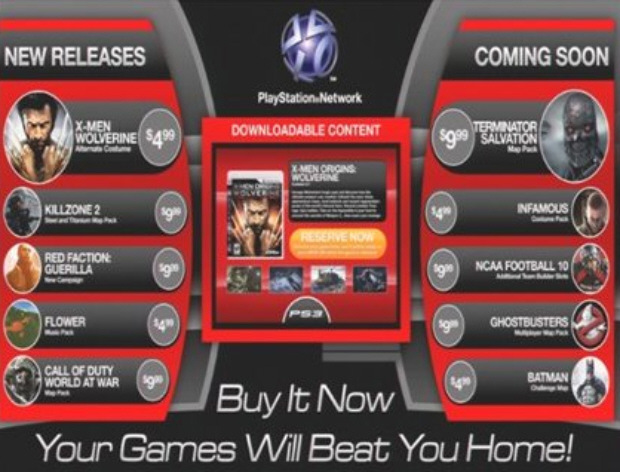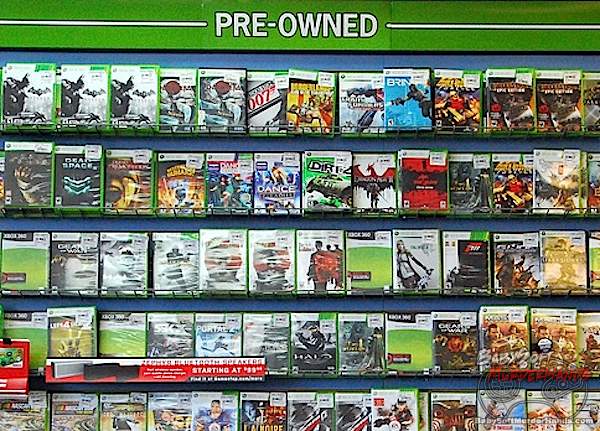Both next-gen consoles have finally been revealed, and all of the cards for this upcoming generation have been laid on the table. One of the more important points of this upcoming console generation was the point of used game sales and how they will pan out on both systems. Sony was very adamant in saying at their press conference that used games will act as they always have, while Microsoft’s Xbox One was very unclear in the months leading up to E3 as it moves toward a purely digital future. One company in particular has a lot to gain or lose on the subject of used game sales: GameStop.
One of the main services the video game retailer provides is the sale of used games. Upon a walk into any GameStop retailer, walls are lined with used games sold to the company by gamers in exchange for store credit. GameStop derives a substantial part of its revenue, as well as the majority of its profits, from used games. While it seems that used games haven’t been completely nixed by the next gen systems, the DRM and services provided by the Xbox One bring into question exactly how important used games are to retailers and to stores like GameStop.

Sony generated a positive reaction at its E3 press event when the company announced that the PlayStation 4 would play used games, and that gamers would retain ownership of the games they buy with no restrictions on sale, trade, or lending of their games.
“That was certainly an impressive moment,” said GameStop’s president Tony Bartel. “The deafening roar that arose from the crowd spoke volumes about the type of functionality gamers find important in next generation consoles. Our PowerUp Rewards surveys suggest gamers’ interest in next generation systems will be negatively impacted if they are limited to digital games or unable to play traded or pre-owned games. Ultimately, the end decision lies with the consumer and GameStop will be there to help them along the way.”
Bartel pointed out that games already in the hands of consumers represent a vast amount of potential game-buying power — if customers are allowed to sell their old games, or trade them in for store credit. GameStop estimated in its last earnings call that the total amount of consumer credit available from games and hardware was over $2 billion. Analysts have said that used games drive up to 17 percent of new game sales.
According to Microsoft, discs only act as a method of installing games on their system, while the games themselves are stored on the cloud. While Microsoft didn’t get its message across very well at E3, there are benefits to its approach. For one thing, not having to worry about putting your disc in the console in order to play a game is an advantage, as is not having to worry about damaging the disc or finding it. Microsoft is probably trying to encourage more digital downloading of games, which could be seen as a threat to GameStop’s business.

However, GameStop has been able to turn the increasing popularity of DLC to its advantage by selling digital value cards in its stores. GameStop has also been training its store personnel to push DLC to game buyers, with positive results. It’s possible that GameStop can find additional ways to work with Microsoft and Sony in order to participate more in the digital sales of full games. While Microsoft has gone on record as saying that all games will be available digitally as well as on disc, Sony hasn’t yet made that clear. Analyst Michael Pachter believes Sony will do that for the PS4, though.
In the near term, GameStop will have a very busy time as a wave of old consoles and games comes flooding into stores from customers seeking to purchase new consoles. The company will be busy with that process for months, and sales will have a substantial boost. It’s the longer term that’s unclear; when the initial wave of enthusiasm recedes, how well will these new consoles sell? Will customers begin downloading new titles in substantial numbers, or will they still be buying discs in stores? There are plenty of unknowns to keep GameStop busy.
In a world where games can be downloaded straight to the system, the importance of games retailers like GameStop is still an open question. GameStop needs to find ways to participate in the changing marketplace, and substantial marketing to make sure everyone is aware of GameStop’s value. It’s a big challenge, and we’ll be watching closely to see how well GameStop meets that challenge.

